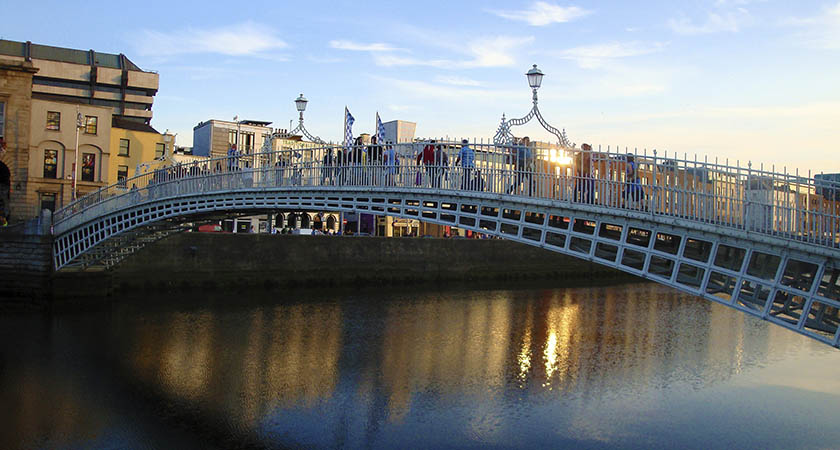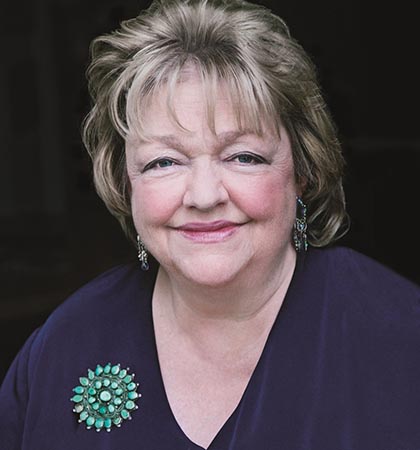AT every family wedding they said to Kate, ‘You’ll be next.’
She never knew whether it was said as a consolation or a threat. She always gave the same rueful little smile, the sort of look that said that she’d never be so lucky as to marry anyone. But in her heart she didn’t want any of the trimmings that she had been through so often with her sisters and her brothers. For Kate had never been in love. At twenty-five that was a shameful thing to admit, so she didn’t admit it.
People had loved her, or had said they loved her. Kate had read all about it, wept over love at the movies, listened to tales of love from her friends. She knew she would recognise it when it happened.
But she nearly didn’t.
Because it happened, of all places, in Birmingham. At a big trade fair in the Exhibition Centre. And his name was Paul and he was an Englishman. This made it both inconvenient and unlikely.
Kate was a Dubliner and her job was there, and her life. All Kate’s family had married great, rangy-looking loud people like themselves, many of them with red hair, all of them with opinions. Paul was small and dark and quiet, and had a habit of letting the other person have their say, which would be looked on with great suspicion by Kate’s family.
They were both embarrassed by how quickly they seemed to recognise a kindred spirit in each other. They kept apologising.
‘I know it’s none of my business but is there . . . I mean, do you . . . are you . . . have you anyone else?’ he said after ten minutes.
‘Nobody at all, no one in the world. And you, tell me, tell me. Sorry to be so impatient,’ she answered.
They went to lunch and to dinner. They went to the pictures. They went on a bus tour. They went to bed. Then they went back to their offices in London and Dublin with little understanding of what they had been sent to inspect and learn.
 They spent days and nights writing to each other but, because letters took so long, they spent hours standing by faxes trying to send off the very private thoughts at exactly the time when the other would be there to intercept them at either end. They were practical.
They spent days and nights writing to each other but, because letters took so long, they spent hours standing by faxes trying to send off the very private thoughts at exactly the time when the other would be there to intercept them at either end. They were practical.
‘It may have been just a few days out of time,’ Kate wrote.
‘Perhaps we shouldn’t build on it.’
‘I’m possibly a bit of a dull chap,’ Paul wrote.
Kate hugged the fax to her for days. Outside school stories she had never heard anyone called a Dull Chap. After six weeks they couldn’t bear it any more. ‘Come to London,’ he wrote in a letter. It crossed with hers saying, ‘Come to Dublin.’
‘I’ve never been to Ireland,’ he said on the phone. So that settled it. He would come for a long weekend. The letters and faxes changed. They were full of longing, and eagerness. As well as dying to see her, he was dying to see Ireland. Kate wasn’t sure if Ireland would live up to the expectations. She knew that she would be fine, like they had been fine in Birmingham, talking, learning, understanding, sharing . . .But would he be confused by Ireland?
He’d want to meet her family! Would they all shout at him and talk at the same time, drowning him totally? Would it look foreign and strange to him with its churches and accents and monuments? Would he understand the jokes? Would he think that people sang too much? Or that it was such a different culture he would just give up on it?
Or, on the other hand, might it be too ordinary, too tame, too like a British provincial city? Not exotic enough – not nearly as different as he had hoped? Kate looked at her own city with critical eyes. The parts she loved so much, like the outlines and shapes along the Liffey, he might think they were just higgledy-piggledy. Would he like to look at people crossing the Halfpenny Bridge like Kate did – watching their faces against a Dublin evening sky?
Would he enjoy going out to Killiney on the little train? Everyone in Dublin was so proud of the DART. Did it get diminished when you called it the Dublin Area Rapid Transit? Kate thought it sounded a bit pretentious, but you’d have to tell him that’s what it meant. Paul wasn’t a man who just assumed things were called the DART for no reason. Would her mother start showing him wedding pictures?
Kate wished that she had been the one to make the journey. But then that would have been stupid, she knew London.
And he’d have to come to Ireland one day, wouldn’t he? She did love him, which was so inconvenient. Kate knew that the only way the visit could be a success was to plan it down to the last detail. She knew that he must meet her parents only at a time when there was no family gathering where he would be suffocated. He must meet her brother-in-law Gerry not at all. Gerry had a line of bad jokes that would put off any potential suitor, even if he were not a quiet Englishman. She would take him to pubs where there was no danger of an impromptu sing-song. She would book the theatre and a couple of nice restaurants. They would go to Dalkey and on a drive to Kildare where she would make sure he saw wealthy properties and realise that the Irish were wealthy, smart people in their own right.
She met him at the airport and they kissed and she almost forgot the carefully structured plan. She drove him home, pointing out sights. He was admiring and eager but mainly he admired the way her hair curled over her cheek or how her eyes sparkled. ‘It’s lovely to have a capital city on the sea,’ he said, and Kate was pleased. She hadn’t thought of that. It was indeed.
‘Everyone’s very young,’ he said approvingly. Again, she thought this might be a disadvantage. It was a young country, certainly, but she had been afraid he wouldn’t like too many hordes of kids.
By the time they got to her flat, Kate was so relaxed she had forgotten entirely about the roadworks that had been underway for some time. She fell straight into a trench and broke her leg. Paul found her house keys, phoned the ambulance and got her to hospital. ‘I’ll look after you,’ he promised into her ear as they carried the stretcher along.
‘But who’ll look after you?’ she wept, her careful plans wrecked around her.
He telephoned her mother.
‘Are you the intended from England? You’re very welcome to these shores,’ her mother said. Kate said she was never going to be better now; her leg would never heal. Why had her mother said that? But Paul just laughed.
Then she heard that her brother-in-law Gerry had a few days off work and was going to take Paul under his wing.
‘I’ve lost him,’ Kate wept to the nurse. ‘I finally fell in love and I’ve lost him before it even got to start properly.’ ‘He seems very attentive,’ the nurse said soothingly, touching the big bunch of flowers with the loving message.
‘That’s now. Wait until Gerry’s had his hands on him.’ Kate was now without hope.
Through the blur of the days that followed she heard that Gerry had taken Paul on a pub crawl, ever looking for the perfectly poured pint and having to try four establishments before they found it. She heard that her father had taken him to Croke Park and explained the finer points of hurling to him; that her brother, who was a soccer fan, had taken him to Dalymount Park and shown him two hours of videos of the glorious summer of the World Cup. He had eaten most of his meals at her mother’s kitchen table. She had been trying to give him decent food since they didn’t have much over in England; it hadn’t righted itself properly since the war rationing.
She remembered him sitting by the bed holding her hand saying that he only wished she was better so that she could come out and enjoy this fantastic city with him. ‘Shouldn’t you have gone home?’ she asked groggily.
‘I got compassionate leave,’ he said and kissed her hot, fevered forehead.
As she got better, the picture of his holiday seemed to become alarmingly clear. Kate’s twelve-year-old niece had taken him on a tour of the places where The Commitments had been filmed, and out to south Dublin, not to see the fishing harbours and eat in the smart restaurants but to take his camera and photograph where Bono lived, and Chris de Burgh and Def Leppard.
Paul said his sister would die when she knew he had seen the places, she would probably be over on the next plane. He had been to markets, to sales of work, he had been taken to the big cemetery to put flowers on the grave of Kate’s grandmother whose anniversary it was; he had been encouraged to go out on his own and explore and told always to ask people’s advice, saying that he was a stranger. Soon he stopped doing this because people gave him so much advice it wore him out, and also because he didn’t feel like a stranger anymore.
The day Kate came out of hospital they had a big family get-together, the kind she had dreaded Paul having to witness.
But now he was part of it all.
‘How did you get so much compassionate leave?’ she had asked, hoping to ease him out of Dublin before he saw them at their worst.
 ‘My fiancée broke her leg before we could even tell the family our plans,’ he said simply. ‘What’s more compassionate than that?’
‘My fiancée broke her leg before we could even tell the family our plans,’ he said simply. ‘What’s more compassionate than that?’
By the time she got to her mother’s home, they had planned the wedding. Without her. They had talked of the numbers, the food, the time of year, the priest who would be nice and ordinary and not frighten the wits out of what used to be called Our Separated Brethren. They were on to the honeymoon before Kate got a word in.
‘Are you all going to come with us?’ she asked.
Gerry, her brother-in-law, wondered where they were going.
It would all depend.
‘I want the honeymoon in Dublin,’ Paul said. Paul! In front of this mob he was giving a dissenting opinion. There was a chorus of other counties. It was like a geography lesson. Every sister and brother and spouse had a view. The compassionate leave would soon be over. Kate’s leg would be better. The roadworks would be completed. And it would be easier to have the wedding the way her mother wanted it. That’s what her sisters had done. And they had been fine weddings. And the tourist-as-husband had chosen the honeymoon.
Kate sighed. Her mother said that Kate was tired. Her father said that Kate needed another drink. Only Paul knew she sighed because it had all turned out so well.


